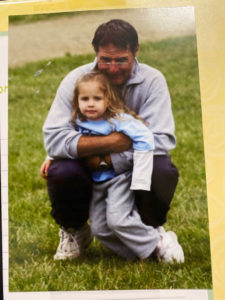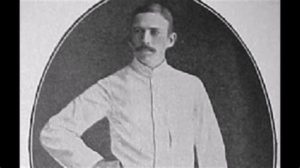“Be on guard. Stand firm in the faith. Be courageous. Be strong.” 1 Corinthians 16:13
 What is courage? Courage has been defined as bravery, but a synonym is really not a definition. I can see a conversation with a student going like this: “What is courage?”
What is courage? Courage has been defined as bravery, but a synonym is really not a definition. I can see a conversation with a student going like this: “What is courage?”
“Courage is bravery.”
“What is bravery?”
“Bravery is courage.”
“But what do bravery and courage mean?“
“They mean the same thing.”
Some have tried to explain it in a little more detail than that. One writer defined it as “fear that has said its prayers.” Mark Twain said, “Courage is the mastery of fear, not the absence of fear.” A courageous person is not someone who is fearless. (That is, in most cases, a stupid person). A courageous person is someone who can control his or her fear and then act. It is overcoming the fear that we naturally have.
A courageous person is not someone who is fearless. (That is, in most cases, a stupid person). A courageous person is someone who can control his or her fear and then act. It is overcoming the fear that we naturally have.
Ray Blankenship was preparing his breakfast one day when he saw a small girl being swept down a flooded drainage ditch. He knew if she was not rescued she would be swept into the main culvert which would certainly result in drowning. He raced ahead of her and jumped into the water and when he surfaced he grabbed the girl’s arm. They went under the surface and came up again, over and over until they were only a few feet from the lethal waters  of the main culvert. Ray’s free hand touched a rock protruding from one bank and as the water tore at him and the young girl, he hung on until help arrived. He was later awarded with the Coast Guard’s Silver Lifesaving Medal. His courage was more than the medal could signify. Ray Blankenship couldn’t swim.
of the main culvert. Ray’s free hand touched a rock protruding from one bank and as the water tore at him and the young girl, he hung on until help arrived. He was later awarded with the Coast Guard’s Silver Lifesaving Medal. His courage was more than the medal could signify. Ray Blankenship couldn’t swim.
We read of acts of courage everyday in these difficult times. We see courage on display among those who are first responders. Firemen and police officers learn to put others before themselves in times of crisis. Certainly the soldiers serving our country display courage every day.  These kinds of people tend to go toward danger rather than away because… well, because that is what they do. That’s their job.
These kinds of people tend to go toward danger rather than away because… well, because that is what they do. That’s their job.
Besides the courage fire fighters and soldiers show, there are other kinds of courage, too. There is moral courage, which is the ability to do right in the face of opposition or discouragement. We will be faced with these kinds of situations much more often than we will be faced with saving a child from a burning building. In 2 Timothy 1:7 Paul tells us that “God did not give us a spirit of timidity, but a spirit of power, of love and of self-discipline.” Everyday we will be tested to do the right thing and tempted to do the wrong. God gives us the power to show moral  courage by being honest and having integrity. Having the power of the Holy Spirit means that we don’t cheat on the test, cheat on our taxes, cheat on others, or cheat in life. Moral courage is honoring others by honoring our word, even when we don’t feel like it. It is saying our “yes, is yes, and our no, is no,” and not turning a yes into a no just because it is convenient for us. God has equipped us with courage, we just need to use it.
courage by being honest and having integrity. Having the power of the Holy Spirit means that we don’t cheat on the test, cheat on our taxes, cheat on others, or cheat in life. Moral courage is honoring others by honoring our word, even when we don’t feel like it. It is saying our “yes, is yes, and our no, is no,” and not turning a yes into a no just because it is convenient for us. God has equipped us with courage, we just need to use it.
It also takes courage to follow Jesus Christ. It takes courage to stand up for Christ. It takes courage to share Christ. We are living in an ABC culture today: “Anything But Christ.”
People are fine with whatever we believe, unless we say, “I believe in Jesus Christ, and  I believe the Bible is the Word of God.” Suddenly we will have joined group of backward intolerants who at the best are laughed at and at the worst are branded public enemy number one.
I believe the Bible is the Word of God.” Suddenly we will have joined group of backward intolerants who at the best are laughed at and at the worst are branded public enemy number one.
It takes courage to invoke the name of Jesus Christ. In some countries it takes the courage of first responders to be believers. They are, in essence, running toward danger by standing for Christ. In our country, in most cases, we merely face discomfort. Of course, it is getting worse and in some cases people might face job loss or public ridicule or more. But let’s face it, bullying is not the same as bullets.
 The Prussian king Frederick the Great was widely known as an agnostic. By contrast, General Von Zealand, one of his most trusted officers, was a devout Christian. At a party the king began making crude jokes about Christ until everyone was rocking with laughter–all but Von Zealand, that is. Finally, he arose and addressed the king: “Sire, you know I have not feared death. I have fought and won 38 battles for you. I am an old man; I shall soon have to go into the presence of One greater than you, the mighty God who saved me from my sin, the Lord Jesus Christ whom you are blaspheming. I salute you, sire, as an old man who loves his Savior, on the edge of eternity.” The place went silent, and with a trembling voice the king replied, “General Von Zealand–I beg your pardon! I beg your pardon!” And with that the party quietly ended.
The Prussian king Frederick the Great was widely known as an agnostic. By contrast, General Von Zealand, one of his most trusted officers, was a devout Christian. At a party the king began making crude jokes about Christ until everyone was rocking with laughter–all but Von Zealand, that is. Finally, he arose and addressed the king: “Sire, you know I have not feared death. I have fought and won 38 battles for you. I am an old man; I shall soon have to go into the presence of One greater than you, the mighty God who saved me from my sin, the Lord Jesus Christ whom you are blaspheming. I salute you, sire, as an old man who loves his Savior, on the edge of eternity.” The place went silent, and with a trembling voice the king replied, “General Von Zealand–I beg your pardon! I beg your pardon!” And with that the party quietly ended.
Von Zealand, a man of great courage, may have found it more difficult to confront his king than to confront the enemy, but he did it. We live in an age of artificial courage. People suddenly become  “gallant” behind the anonymity of the internet. But courage is not a unsigned castigation of someone who offends Christ in cyberspace. Courage is the reasoned, loving, defense of our Savior with those that we can look in the eye. Years ago I heard a coach on the other side of the lockers make an offensive Jesus joke. I did not approach him. I don’t know why. But even to this day, it haunts me. I wonder if that wasn’t my chance to stand strong and in doing so to share the gospel with someone who needed to hear it.
“gallant” behind the anonymity of the internet. But courage is not a unsigned castigation of someone who offends Christ in cyberspace. Courage is the reasoned, loving, defense of our Savior with those that we can look in the eye. Years ago I heard a coach on the other side of the lockers make an offensive Jesus joke. I did not approach him. I don’t know why. But even to this day, it haunts me. I wonder if that wasn’t my chance to stand strong and in doing so to share the gospel with someone who needed to hear it.
A few years ago shared Christ with a homeless woman at a rest stop. It still took me awhile to get to the point. Afterwards I ask myself why was I so nervous about sharing Christ with someone I did not know, who I would never see again, who needed to hear about Jesus. Her cardboard sign was not a weapon and the only negatives I faced was maybe a sneer or an unkind word. I really didn’t fear those things as long as I held a few bills in my hand. I talked to her  about the Lord, gave her some literature, and had a nice talk, but I was struck by my hesitancy.
about the Lord, gave her some literature, and had a nice talk, but I was struck by my hesitancy.
If I am this nervous about conversing with a complete stranger, how can I muster up the courage to speak to a co-worker, friend, or relative. Gosh, I might have to see them the next day! I have been equipped, but sometimes I leave my armor at home. I must put it on everyday. I know better than to fear. In all my years of sharing the Lord, I have never had a terrible experience. I have maybe had some pushback, but never more than that. Sure, I did get one negative remark on a teaching evaluation once about “sharing” a bit too much, but whoop-de-do. The firing squad must have been off duty that day.
 We should have more courage than those who don’t have the truth, but there are times that we seem more fearful. It is funny that many around us have no compunction about offending others. They mistake that for courage. But, insulting others is not courageous. Offending others is not courageous. Truthfully pointing out sin, the need for redemption, and the way to salvation is courageous. Doing that is much more difficult than just insulting someone. The gospel is the most important thing we can share. It can be life changing. Name calling is easy, asking someone to call on His name is more difficult.
We should have more courage than those who don’t have the truth, but there are times that we seem more fearful. It is funny that many around us have no compunction about offending others. They mistake that for courage. But, insulting others is not courageous. Offending others is not courageous. Truthfully pointing out sin, the need for redemption, and the way to salvation is courageous. Doing that is much more difficult than just insulting someone. The gospel is the most important thing we can share. It can be life changing. Name calling is easy, asking someone to call on His name is more difficult.
 Courage starts with the little things in our daily lives. I used to tell the athletes I coached that they needed to work as hard as they could in practice because victory over the little things in practice when there was no opponent prepared them for victory over the bigger things when there is an opponent. If we cannot stand for right in the face of little opposition, how will we ever stand against the real enemies.
Courage starts with the little things in our daily lives. I used to tell the athletes I coached that they needed to work as hard as they could in practice because victory over the little things in practice when there was no opponent prepared them for victory over the bigger things when there is an opponent. If we cannot stand for right in the face of little opposition, how will we ever stand against the real enemies.
A boy was trying to impress a girl he liked by saying, “I will climb the highest mountain, swim the swiftest river, and cross the driest desert for you, and I will come over tomorrow if it is not raining.” Can we do great things for God during times of great trial, if we struggle to do simple things for Him in everyday life?
Psalm 27:1 says, “The LORD is my light and my salvation; Whom shall I fear? The LORD is the strength of my life; Of whom shall I be afraid?” We all want to believe we are courageous, but courage is action, not just belief. We must stand firm in the faith. We must be courageous. We must be strong. That’s our job.































